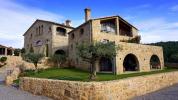H2020 ORC-PLUS Project: Organic Rankine Cycle: Linking the prototype to the storage unit
- Type Project
- Status Filled
- Execution 2015 -2019
- Assigned Budget 6.249.316,25 €
- Scope Europeo
- Main source of financing Horizon 2020
- Project website Proyecto ORC-PLUS
The starting point of the ORC-PLUS project is the CSP plant located at IRESEN's Green Energy Park in Benguerir, Morocco. This plant is composed of a solar field of FRESNEL solar collectors, using thermal oil as the heat transfer fluid, and an Organic Rankine Cycle (ORC) power unit coupled with an air cooler. Compared to this initial state of this plant, the ORC-PLUS project, by developing an optimized combination of innovative TES units and specialized engineering tools for this type of plants, aims to increase the plant's power production to up to four hours during non-sun hours, ensuring production costs that are competitive with the target market.
To achieve the project objective, the ORC-PLUS consortium has analyzed two different TES thermocline systems at the prototype level. The first TES system uses a mixture of low-temperature melting salts as the heat storage material (HSM), and the second uses magnetite pebbles and oil as the HSM + heat transfer fluid (HTF). At the end of the second period, the ORC-PLUS consortium presented its economic evaluation comparing the two aforementioned TES technologies, which provided evidence that the thermocline oil + magnetite pebbles-based solution is cheaper than the low-temperature melting salts-based thermocline solution. This difference is partly due to the lower cost of the magnetite material and partly to the different amount of HSM (the molten salt-based solution is disadvantaged by the maximum operating temperature of the HTF employed in the solar field).
At the end of November 2017, the ORC-PLUS consortium completed the final design of the TES pilot system based on the main results obtained within the framework of:
- WP2 (development of simulation models).
- WP3 (material characterization analysis).
- WP4 (TES test system design and implementation). This action was accompanied by an in-depth analysis of the risk assessment to identify potential risks that could contribute to project failure.
The approach followed during the risk assessment analysis was to use the ongoing project as a test case to outline the most important specifics of innovative thermodynamic solar energy projects such as the ORC-PLUS plant. The installation of the Fresnel solar collector for the ORC-PLUS solar field was completed on site. Under the project, CIC has developed a 1/100 scale TES test prototype using oil and FSM (magnetite) and completed experimental system characterization tests.
In parallel, F-ISE has completed testing of its experimental mock-up. This mock-up consists of a molten salt thermocline system without an internal heat exchanger, designed to demonstrate the effect of inserting a heat exchanger into a single-tank system and, with the experimental results, contribute to the validation of the molten salt-based TES system model. ENEA has completed the construction of its prototypes dedicated to analyzing the behavior of innovative oil-based heat exchangers specialized for the low-melting molten salt thermocline TES system.
At the end of October 2019, the construction and cold commissioning of the TES pilot plant at Green Energy Park (Ben Guerir, Morocco) was completed.
The deregulation of the electricity generation market and the current evolution of environmental regulations are inspiring the development of distributed public services close to local demand. This trend will reduce the oversizing of the electricity grid and the costs of electricity transmission and distribution. In this context, low-megawatt solar thermal (CSP) plants, combined with advanced TES systems, could play an important role, as they have all the characteristics to closely monitor demand and the potential growth of local electricity demands.
Furthermore, unlike other systems, they are easily integrated into local district heating. In this context, the H2020 ORC-PLUS project seeks to develop, at the pilot level, an innovative thermal energy storage system capable of expanding the energy production of an existing solar thermal power plant located in Morocco, using linear Fresnel collector technology as the solar field and an ORC turbine with a nominal power of 1 MW as the power unit.
The heat transfer fluid used by the current CSP plant is an environmentally friendly mineral oil that operates in a temperature range of 180°C to 300°C. The project will support electrification programs in rural and semi-urban areas, creating new investment opportunities in peripheral areas with a positive socioeconomic impact. A significant outcome of this cooperation is the network of experience exchange and mutual support between European and Moroccan stakeholders, key to developing a new renewable energy plant model geared toward the development of the local population.
The objective of the ORC-PLUS project is to validate, in a relevant industrial context, an innovative TES system optimized for a medium-sized CSP plant, coupled with a 1 MWe ORC turbine. Validation of this new CSP plant model in a relevant environment will accelerate the development of local green smart grids.
In line with the H2020-LCE-03-2014 call for proposals, ORC-PLUS focuses on increasing the technological performance of renewable energy systems, reducing costs, and improving dispatchability. The objective is to develop an optimized combination of innovative thermal energy storage (TES) (specialized for 1-5 MWe CSP) and engineering solutions to improve the production hours of an existing small CSP plant located in a desert area and coupled with an ORC system. With an optimized TES solution, it is possible to extend the power production periods of a CSP plant (also during non-solar radiation), eliminating or minimizing the need to burn fossil or renewable fuels in hybrid or backup systems. Currently, R&D efforts are being dedicated to TES for utility-scale plants, although great potential exists for small- and medium-scale CSP installations. ORC-PLUS ranges from full-scale prototype to pre-commercial-scale demonstration.
The proposed technology is based on a solar field, using thermal oil as a heat transfer fluid, and an ORC power unit coupled with an innovative TES. An experimental demonstration of two different industrial prototypes of TES systems will be conducted in a relevant environment (TRL 6). For each prototype, a simulation model of the pilot processes will be developed, using prototype TES systems. The models will be optimized based on site characteristics and energy load to determine the relevant conditions and parameters of real-world scenarios for each application and select the TES technology that best suits the needs of the target sector.
The final result will be an industrial pilot plant that will be used to validate the technology in a real-life operating environment and demonstrate its viability (TLR7). Validation includes an analysis of the technoeconomic feasibility and environmental impact, as well as the replicability of the final pilot plant design. This proposal is supported by three letters of support from ESTELA, ANEST, and Green Energy Park (Morocco).
ORC-PLUS aims to develop renewable energy generation, which is currently covered by diesel generators in some areas of the Mediterranean and sub-Saharan Africa. The expected CO2 emission reduction is set at 920 tCO2/year (conversion factor used: 0.460 tCO2/MWhe per year).
Market Transformation: The smaller size of this new CSP concept requires a lower investment compared to large CSP plants, so this action will allow small and medium-sized enterprises (SMEs) the opportunity to enter the future smart renewable generation energy market. Policy The project will support electrification programs for rural and semi-urban sites and provide access to electricity to marginalized social classes. This will make it possible to provide new guarantees and incentivize private investors to relocate industrial or commercial activities to peripheral areas.
In short, the project will promote territorial cohesion and inclusive economic growth models. Improved EU energy security. ORC-PLUS will contribute to improving EU energy security by supporting the development of small storage systems powered by renewable energy sources, key elements for the successful integration of renewables with conventional generation (smart grids). Joint actions with Member States/partner countries. ORC-PLUS will improve the coordination of energy R&D&I programs with partner countries such as Morocco (directly involved in the project) and other countries, laying the foundations for a greater positive contribution to EU social security.
- AGENZIA NAZIONALE PER LE NUOVE TECNOLOGIE, L'ENERGIA E LO SVILUPPO ECONOMICO SOSTENIBILE (ENEA)







